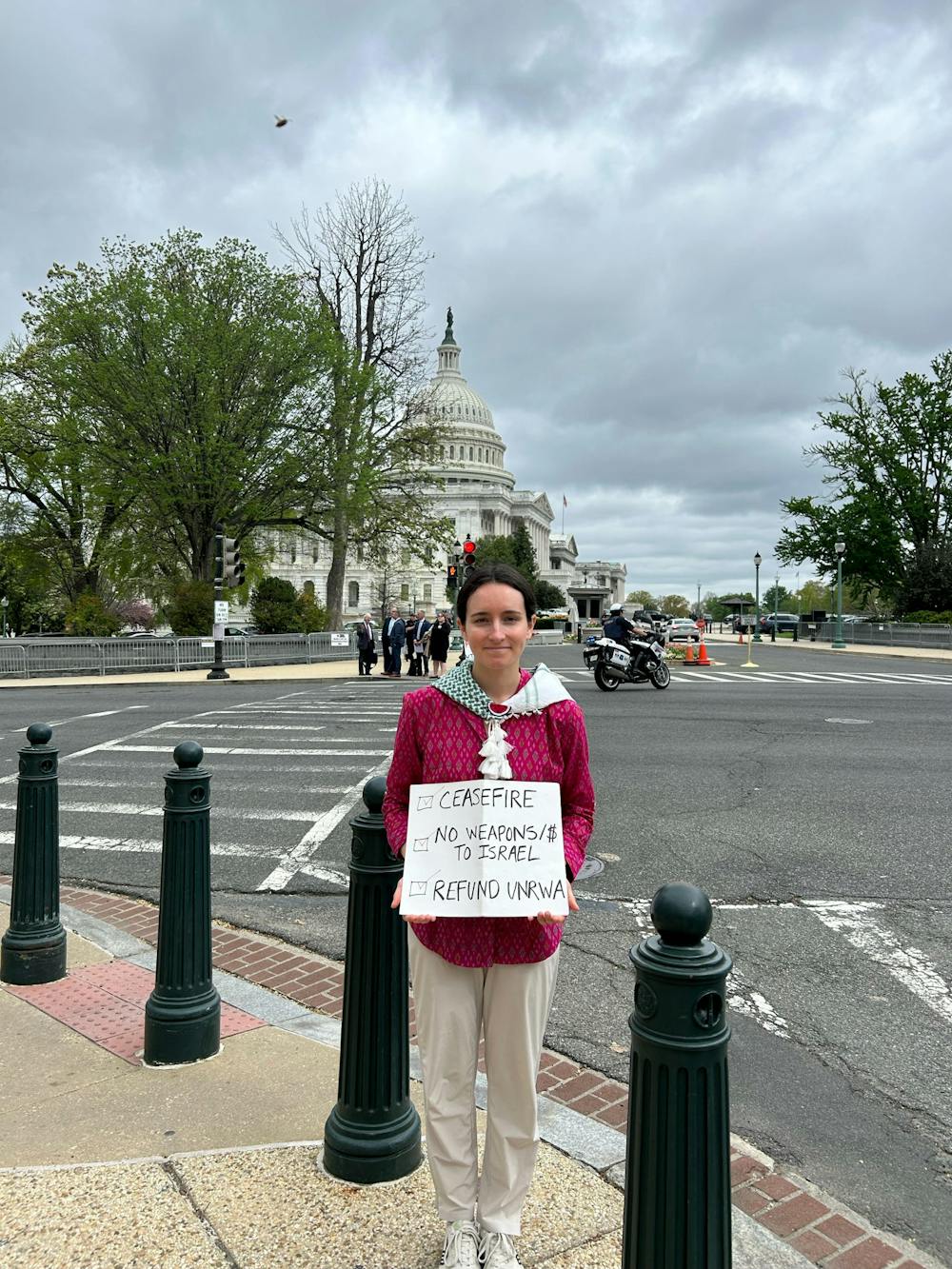I can no longer serve as a student worker at American University and its School of International Service, as the current administration has repeatedly suppressed my attempts to advocate for basic human rights. Recent statements and policies issued by the Office of the President reflect an ongoing effort to censor students and faculty trying to speak for Palestinians. I am also not comfortable working for a school dedicated to “international service” that cannot uniformly condemn the genocide, ethnic cleansing and collective punishment of the Palestinian people.
If I were not less than two months away from earning my degree, I would withdraw and transfer to another program.
Over the past few months, I have written to over a dozen administrators multiple times regarding my concerns with the University’s failure to acknowledge the crisis in Gaza and their restrictions of free speech on campus. In these emails, I repeatedly stated that I believe AU and SIS have an ethical imperative and scholarly obligation to defend international humanitarian law.
I pointed out the blatant hypocrisy of our proclaimed “neutrality” by combing through old statements issued by the current administration. I called upon the stated vision and values of both AU and SIS to urge a change in policy. I upheld that the University cannot suggest that a humanitarian crisis is a “controversial issue” and that doing so has consequences far beyond our campus. I also asked my administrators to demonstrate concern for the impact live-streamed genocide has on everyone in their community. In all the ways I know how, I pleaded with University leadership to recognize and defend the humanity of Palestinians. By failing to do so, they have failed to protect and uphold everyone’s humanity.
My emails received only one reply from one administrator (excluding the stock email I received from President Burwell on Jan. 31). Our follow-up meeting was immensely disheartening and confirmed my assumptions as to why after five months, American University still refuses to use the words “Gaza,” “Palestine” or “humanitarian crisis” in a statement. The unprincipled political-mindedness guiding AU leadership must change.
My individual advocacy efforts have also been suppressed. An administrator turned down my event proposal for “Waging Peace Hours” (a Congressional letter-writing campaign), and every single poster I put up calling for a ceasefire was taken down. Even posters with QR codes to link students to D.C. advocacy events were removed. AU has repeatedly made clear that my attempts to speak out against U.S.-sponsored genocide and defend the most basic rights of Palestinians are not aligned with its interests.
After Aaron Bushnell self-immolated a mere mile from our campus to protest the atrocities of the American government our administration still remained silent. I realized then I must take bolder actions to stand up against injustice.
I believe university administrations across the country have played a role in the ongoing genocide in Gaza. They have hindered young people from mobilizing into action by attempting to silence students, staff and faculty in the most dire of times. They have contributed to a broader culture of fear, complacency and desensitization to violence and fed an ignorant falsehood that speaking for Palestinians is antisemitic. In doing so, they have asserted that human rights, freedom and dignity are a zero-sum game.
I am particularly disillusioned with the School of “International Service.” While the words “Lead. Serve. Make A World of A Difference” and “Waging Peace since 1957” decorate our building walls and admissions brochures, students are discouraged from speaking out against genocide and calling for a ceasefire.
As a whole, SIS has not addressed Israel’s ongoing siege of Gaza and the harrowing atrocities and human rights violations being waged against Palestinians. Although the SIS staff and faculty letter, released in November 2023, represents an effort to stand against dehumanization and war crimes, it was clear it “does not represent SIS as a whole, only the signatories.” Even after 50+ countries testified against Israel’s illegal occupation of Palestinian land in the UN’s International Court of Justice, the ICJ ruled Israel’s actions in Gaza amount to a “plausible genocide,” AU’s “top international affairs program” remains unable to address what is at stake for the so-called “rules-based order.” The world has changed, but AU and SIS want their students to live in cognitive dissonance.
On the ground floor of the atrium, a book poster with Israeli Prime Minister Benjamin Netanyahu’s image is still displayed a few feet away from another titled “The Politics of Genocide.” For the past five months, it has served to remind me how gravely our praxis has failed at this time and how our University contributes to the unfolding politics of this genocide.
I know there will come a day when it will be widely understood that the “Israel-Hamas war” was not a “war” at all. The genocide of the Palestinian people may be considered the most shameful and tragic in modern history, as the world watched the unfathomable destruction and destitution unfold in real-time. Israel’s entrenched impunity will be recognized as a deep wound in the collective conscience, and American academic institutions will be criticized for quelling dissent. I believe this period will define the integrity of individuals and institutions alike.
I was never naive or idealistic enough to ask AU to call for liberation and an end to Israel’s occupation and apartheid. However, I did expect AU to stand for international humanitarian law. I requested the Office of the President allow students to freely and peacefully call for change, and I demanded that they stop suggesting their lack of concern for Palestinian, Arab, and Muslim students was in service of protecting Jewish students.
I sincerely hope American University leadership will change so that AU may live up to the values it displays so proudly when trying to get students to invest in it. Administrators must recognize that repression breeds resistance and they would do better to facilitate respectful, critical dialogue on our campus. Moreover, any university that claims to be committed to democracy cannot silence the voices of their students, faculty or staff. Their words are the most vital tools for peaceful change, and whether they like it or not, their words will set Palestine free.
Julia Norman is a master’s student studying Global Environmental Policy in the School of International Service.
This piece was edited by Alana Parker, Jelinda Montes and Abigail Pritchard. Copy editing done by Luna Jinks, Isabelle Kravis and Charlie Mennuti.





